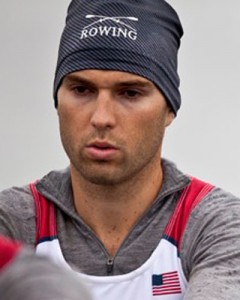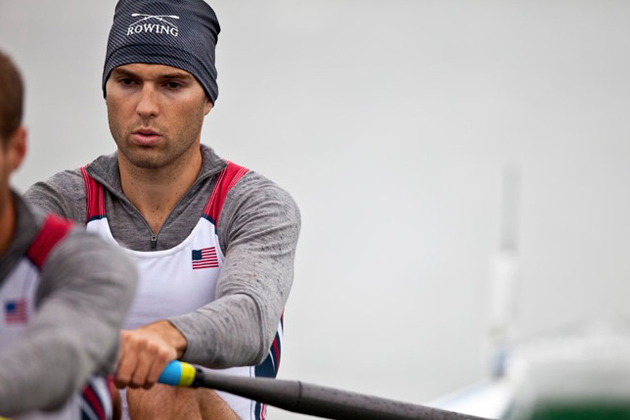
Finals week is a time for most Law School students to hunker down in the library or lock themselves in their rooms with stack of books and class notes, anxiously trying to recall the details of a case study or legal code. For Jonathan Winter, finals week was a time to clear his mind, travel, and compete. That’s because throughout his time at the School of Law, Winter also was a competitive rower, representing the U.S. at events across the globe.
Winter first got a taste for rowing as a senior at Choate Rosemary Hall in Wallingford. During his undergraduate years at Lehigh University, Winter honed his skills, even buying his own boat – called a scull – so that he could practice in the morning with his college team and practice alone in the evenings. When he completed his engineering degree in 2006, Winter knew he wanted to do two things with his life: earn a spot on the USRowing national team and get his law degree so he could practice patent law.
His first years after graduating from Lehigh were dedicated to rowing. He participated in the national circuit and was dubbed an up-and-coming rower until a torn retina took him off the water in 2008. That same fall he started classes at the UConn Law School, commuting an hour each way from Milford so he could continue his athletic training.
By May 2009, Winter’s eye injury had healed, he was a member of the U.S. national team and was on the verge of being selected to compete at World Cup races in Europe. There was only one problem – The National Selection Regatta, the competition that determines who gets to compete – overlapped with his Constitutional Law final. “I got a deviation, so I took one exam on a Thursday, drove down to the race on Friday, took part in the competition on Saturday and Sunday, then drove back and took the Con Law exam on Monday,” he says. He went on to repeat that hectic scramble each May.
Winter says the key to being both successful on the water and in the classroom was time management. “I learned to be self-sufficient in my studying. I made sure that I would learn the material as we were going through class and that I really understood it, so that when I was studying I didn’t have to learn anything. It was more like reminding myself,” he says. “It’s a lot like sports. I can’t just start training five days before the race and expect to do well. So I took the same approach to studying – just do a little bit every day.”
Winter maintained that balance throughout his time in law school, all the while improving his position on the U.S. Rowing team. He even worked to improve the sport by creating a device that makes adjusting the oar lock on a boat easier. Winter says prior to his invention, adjusting the lock was difficult or required special tools. He now holds a patent for the device.
In 2010, Winter took a semester off so he could compete in the World Championships in New Zealand. It was an experience that set his studies back a few months but one he says he would not trade for anything.
“I look in my closet and I must have 15 or 20 rowing uniforms that I wore in international competitions. You can’t buy them like an NBA jersey. It was great. I got to represent the U.S,” he says.
Winter completed his law degree in January this year, and decided to take a break from rowing after he and his teammate failed to qualify for the Olympics. It means that for the first time ever he can focus solely on his legal studies as he prepares for the patent bar exam. He has applied to several law firms, and says he will most likely stay in Connecticut.
Winter says his rowing career taught him something about himself, something he knows will carry him far in his new career as an attorney:
“Rowing has given me the ability to focus on something for hours, weeks, months, and years. That ability to focus is very helpful as a lawyer. Some cases take six years. I know I have the patience to accomplish the work I need to do.”


